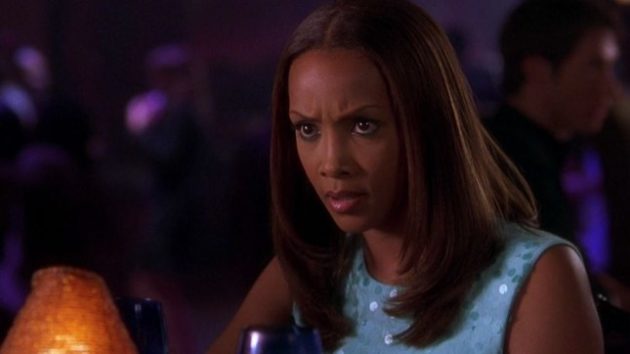Is Two Can Play That Game the Original Think Like a Man?

While Think Like A Man may have conquered the domestic box office two weekends in a row – an impressive feat for what Hollywood execs refer to as an “urban comedy” – there’s no question that the film’s success is as much due to the popular self-help book on which it is based as it is to its comedic merits. Roger Ebert hit the nail on the head in his review, remarking: “The movie's mistake is to take the book seriously. This might have worked as a screwball comedy or a satire, but can you believe for a moment in characters naive enough to actually live their lives following Steve Harvey's advice?” The funny thing is that the screwball version film Ebert would have liked to see actually exists -- and is infinitely superior to the more dramatic, contemporary incarnation.
That film is Two Can Play That Game, Mark Brown’s hilarious entry in the battle-of-the-sexes subgenre. A distant descendant of true screwballs (most notably The Awful Truth, which depicts a recently divorced couple’s attempts to derail one another’s new romances), Two Can Play That Game is, like Think Like A Man, anchored by a character explaining dating rules and philosophy to the audience. However, in this film that character actually has skin in the game – in fact, she’s its heroine: Shante Smith (Vivica A. Fox) is an ad agency exec who dispenses advice to the audience (and her girlfriends) about her seemingly perfect “Ten Day Program” for keeping a straying boyfriend in check; when her own boyfriend Keith (Morris Chestnut) begins to stray, a battle of wits ensues. The Kevin Hart comedic-sidekick role is played here by Anthony Anderson, as Keith’s relationship consigliore. Anderson knocks the role out of the park, with a performance that easily steals the entire film.
It’s true that the most dramatic moments of Think Like A Man – when the characters try to level with each other and Own Up To Their Mistakes - are the moments in which it feels the most deadened. Two Can Play That Game, alternatively, embraces its absurdity; like its finest performance, it doesn’t take itself too seriously. In one scene, when Anderson seconds the points Keith makes by shouting as if he’s at church, an organ and chorus suddenly appear on the soundtrack to emphasize the revelations the men are coming to about women. The film, at various points, informs us that the first law of thermodynamics explains how best to manipulate your partner; has Vivica A. Fox punch Gabrielle Union in the face; and, in the funniest scene, puts forth the theory that church is a better place to pick up promiscuous women than a nightclub.
And while the film understands that it’s a light comedy, it’s not lacking for bombast. “This is way bigger than you,” Anderson tells Chestnut late in the film. “You’re doing this for all men across the country. You’re doing this for men all around the world!” With increasingly deranged anxiety, Anderson goes off the rails: “Pretty soon women are gonna be pulling these head trips on us, dog, and you know what’s gonna happen? We’re gonna be the ones cooking dinner! We’re gonna be the ones changing the diapers! We’re gonna be the ones washing the dishes! And you know what they’re gonna be doing? They’re gonna be sitting on our couches, watching football on our Sunday!”
Between putting forth the misguided belief that people need to engage in psychological warfare to keep their partners in line and the propagation of all kinds of stereotypes and clichés, no one’s going to accuse either of these movies of responsibly depicting gender relations. But when choosing one to watch, a viewer is well-advised to pick a film that is fully aware of – and complicit in – its own absurdity.
Zachary Wigon is a writer based in New York. His work has appeared in the New York Press, NYLON, and Filmmaker Magazine, among many other outlets. He tweets @zachwigon.

Comments
I *love* Two Can Play That Game -- fun, funny and insightful too. So glad to see a review encouraging people to check out this gem!
The only similarity between these two films, other than an African American cast, is that they both deal with relationship advice. That's it. I fail to see why a comparison was even made. Both of these movies were entertaining based on their own merits. I wonder if Roger Ebert read Steve Harvey's book. Many women found it very helpful and enlightening to read about how men viewed many aspects of relationships from a man's point of view. I would think most people who buy self-help books don't follow them "to the letter" but use them as a guide, which is after all the point. Mr. Ebert's mistake is that he takes himself too seriously.
never thought about it but you're right about the comparison. i remember really liking "two can play that game" but now i refuse to see "think like a man".. hmmm....
u should go see it, i've seen it twice b/c it is really entertaining...two can play that game can't EVEN compare.....